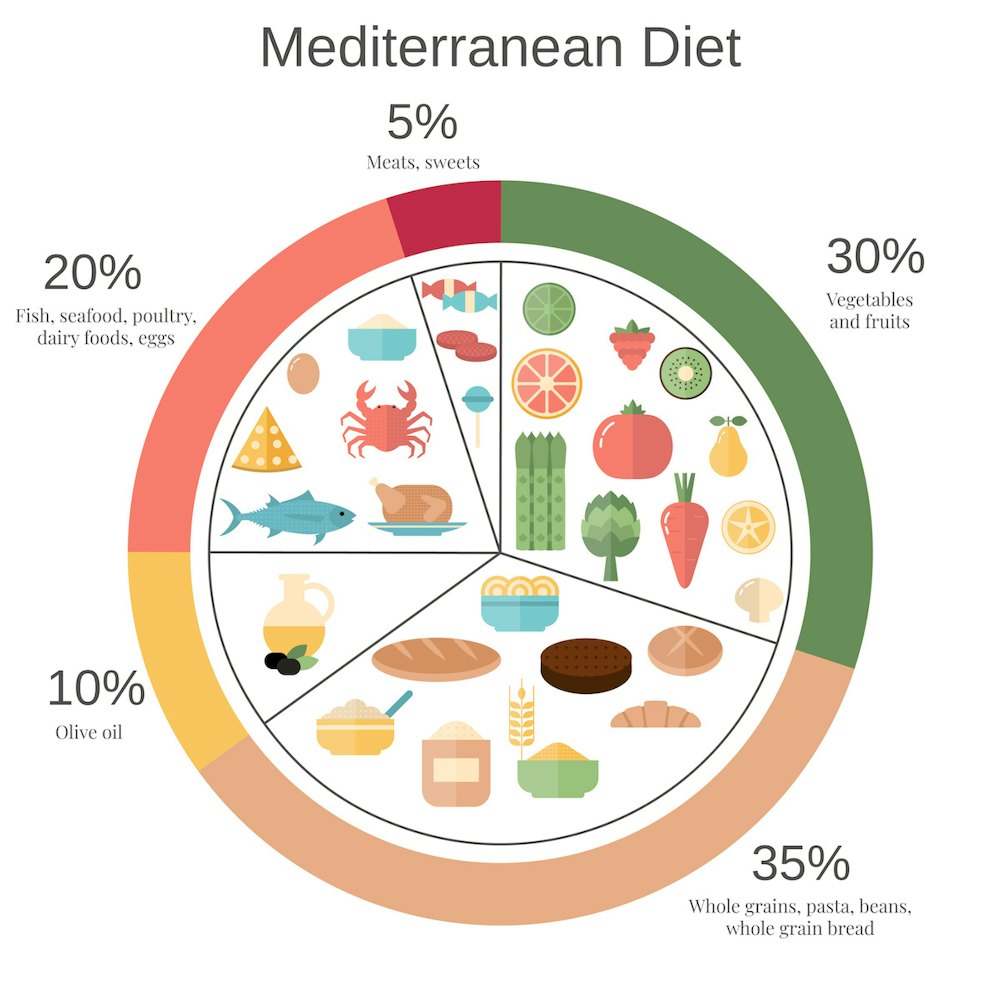- How the Mediterranean Diet Works
- Effects of the Mediterranean Diet
- The Mediterranean Diet for Weight Loss
- Is the Mediterranean Diet Safe?
- Should You Try the Mediterranean Diet for Weight Loss?
The Mediterranean diet is a plant-based diet that can vary by country and region since it is a generic term based on the traditional eating habits of the countries that border the Mediterranean Sea. If you’re looking to use the Mediterranean diet for weight loss, you may wonder if it’s safe to do and whether it will produce long-term benefits.
In short, yes, the Mediterranean diet is a healthy way to drop pounds. But even more, it has been shown to reduce the risk of heart attack, stroke, and death related to heart problems by 30%. This diet is often used to control blood sugar and prevent chronic diabetes long-term.
Learn more about how the diet works, its effects on the body, how it’s safe for weight loss and who should avoid the diet all together.
How the Mediterranean Diet Works
The Mediterranean diet is a plant-based diet (somewhat similar to the paleo diet) but is focused on:
- High amounts of vegetables, fruits, potatoes, bread and other grains, beans, nuts, and seeds
- Olive oil as a primary fat source
- Low amounts of dairy products, eggs, fish, and poultry

Meals are planned around these foods based on serving sizes per meal, day and week. The diet also avoids sweets, red meats, fried foods, and white flour products.
This may look like:
| Food | Serving Goal |
| Fruits | 3 servings per day |
| Vegetables | 3+ servings per day |
| Legumes | 3 servings per week |
| Fish | 3 servings per week |
| Whole Grains | 3 to 6 servings per day |
| Nuts | At least 3 servings per week |
| Extra Virgin Olive Oil (EVOO) | At least 1 Tbsp per day |
| Poultry | Unspecified servings; choose only white meats |
| Dairy | Unspecified servings; choose only fat-free or low-fat dairy products |
| Eggs | Limit egg yolks to 1 yolk per week |
| Red meat | 1 serving per week |
| Wine (optional) | None; or 1 glass a day for women; 2 glasses a day for men |
| Baked Goods | Avoid or limit homemade goods to less than 3x per week |
Unlike other restrictive diets—though it suggests the proportion of foods to eat—it does not specify portion sizes, specific amounts or restrict calorie intake. It is up to each person to determine the right about for their level of physical activity and body size.
Effects of the Mediterranean Diet
Due to its balanced nature and focus on heart-healthy foods, a Mediterranean-style diet is approved by the American Heart Association as a way to help you achieve its recommendations for a healthy dietary pattern.
A Mediterranean-style diet may:
- Help reduce the risk of heart disease
- Help protect against cancer
- Help reduce the risk of stroke in women
- Stave off and manage Type 2 diabetes
- Relieve symptoms of rheumatoid arthritis
- Prevent cognitive decline and Alzheimer’s disease
- Help with weight loss and maintenance
- Help ease symptoms of depression

The Mediterranean Diet for Weight Loss
While you can use the Mediterranean diet for weight loss purposes, that isn’t necessarily its main goal—rather, it helps create a healthy eating pattern for individuals that can be maintained long-term.
However, for those looking to lose weight, it can be beneficial in helping you drop some pounds. In a 2018 study published in Nutrition & Diabetes, researchers concluded that lower levels of weight gain and less increase in waist circumference were associated with following a Mediterranean diet. More studies are needed, however, to confirm their findings.
Since the Mediterranean diet is centered around nutrient-rich foods while limiting processed foods and added sugars, weight loss may happen naturally.
In a 2010 study, overweight participants were put on three types of diets:
- A low-carb Mediterranean diet
- A traditional Mediterranean diet
- A diet based on recommendations from the American Diabetes Association (ADA)
All groups were required to exercise at least three times per week for 30-45 minutes. At the 1 year mark:
- Those following a traditional Mediterranean diet lost an average of 16 pounds
- Those following a diet based on the ADA lost an average of 17 pounds
- Those following the low-carb group lost an average of 22 pounds
Additionally, unlike most fad diets, maintaining this type of diet has also shown to be easier than adhering to calorie-restrictive or fasting-style diets. One study of more than 32,000 people, results showed that over five years, those following a Mediterranean diet had a decreased risk of both belly fat and gaining weight.
Is the Mediterranean Diet Safe?
Generally, the Mediterranean diet for weight loss is a safe option for most people. Because it follows a diet of whole grains, vegetables, beans, and fruit, most individuals can see health benefits from adhering to this type of diet.
The Mediterranean Diet May Improve Your Health
According to the Academy of Nutrition and Dietetics, it can reduce the risk of heath conditions like heart disease, type 2 diabetes, and hypertension in some individuals.
Further, the American Institute for Cancer Research also recommends a plant-based diet for cancer prevention which follows closely with the Mediterranean diet.
Who Should Avoid the Mediterranean Diet?
Though the diet is relatively safe, for some populations, it may have negative mental, physical and/or biological health effects. This can include:
- Weight gain from consuming too many fats (e.g., olive oil and nuts)
- Low iron levels from reduced meat consumption
- Calcium loss from fewer dairy products
- Creating disorder eating due to its more restrictive eating habits
The Mediterranean diet should not be followed without medical supervision for those suffering from already low iron levels or those that need more calcium in their diets. It should also be avoided for those suffering from disordered eating or struggling with an eating disorder.
Should You Try the Mediterranean Diet for Weight Loss?
The Mediterranean diet has many health benefits when followed correctly, with its biggest advantage being a reduced risk of heart disease. When used as a weight loss method, individuals may see pounds dropping due to a restriction on processed foods and sugars over time.
There is no quick-fix diet, and whether choosing the Mediterranean diet or another method, the healthiest way to lose weight and keep it off is by following a balanced diet that falls within The Dietary Guidelines for Americans, 2020-2025. This includes maintaining a heart-healthy lifestyle, avoiding smoking, and exercising regularly.


Comments